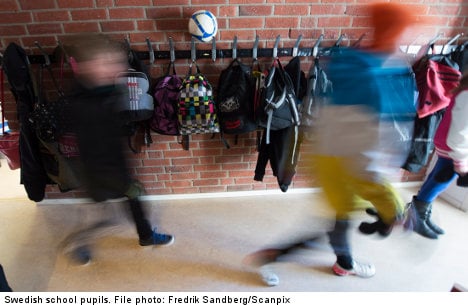Among other things, the new accord gives authorities the right to force under-performing free schools to hire more teachers.
The four parties that make up the governing centre-right Alliance coalition have been in long and intensive talks about the reforms with the Social Democrats and the Green Party.
“We have solved most of it, but each party has a few questions left they want answered,” the Greens’ Mats Pertoft told the TT news agency.
The education minister, meanwhile, welcomed the negotiated deal.
“This is the domestic policy area where the hardest battles have been fought in the past 25 years,” Jan Björklund of the Liberal Party (Folkpartiet) told reporters.
“It’s a very positive step that we have such a broad agreement.”
Björklund said he believed that most graduates of free schools in Sweden were probably happy with their choice of education, but said there had been cases of poor management. Last year, a licence to run a free school went up for sale on the buy-sell site Blocket, causing a minor education scandal in Sweden.
“There will now be rules that place higher demands on long-term planning and requires serious commitment from the parties involved,” Björklund said on Thursday.
He said the government should have time to draft the new proposals into legislative bills before the autumn 2014 general elections. One such reform would allow Sweden’s Schools Inspectorate (Skolinspektionen) to force schools to hire more teachers if reviews showed there were gaps in teaching.
The package of reforms also include a requirement to check the financial background of would-be free school administrators.
“It is odd that this should be required, but it has happened that people who have committed serious crimes were given a permit,” said former Liberal Party head Lars Leijonborg, who chaired the committee tasked with coming up with the reforms.
For the permit to change hands as happened in the Blocket case, for example, the Schools Inspectorate will now have to informed by the stakeholders beforehand.
The cross-party agreement did not, however, ban venture capitalists from the tax payer-funded education sector – an issue at the heart of an ongoing debate in Sweden about the role of private interests in the public sector.
“It is very hard to define what a venture capital company actually is,” Social Democrat education spokesman Ibrahim Baylan told TT, adding that the new deal would nevertheless put a lid on excessive profits.
“My interpretation is that we are making it harder for people who have planned to do a four to five year stint in free schools, earn a bundle and then get out,” Baylan said, adding that such behaviour should lead to the licence-holder not being given a new permit to operate free schools in Sweden.
“We don’t want that in our schools.”
Leijonborg added that the issue of profits and ownership had been included in the agreement.
“We’ve written that we feel some concern about some of the owners’ company structures,” he said, but underscored that a separate investigation into the matter is underway across the Swedish welfare sector.
The political parties also agreed that all free school employees should have the right to be protected if they feel compelled to whistleblow. The Swedish guiding principle that allows all public sector staff to speak out anonymously about their work would thus be extended to employees of private companies that run on public money.
The agreement also introduced the possibility for the Schools Inspectorate to force free schools to hire more teachers if their students’ academic success rate wanes.
The broad agreement was hashed out in detail to ensure that reforms survived a potential shift in power over time, providing stability to the education sector. The free school issue is considered ideologically contentious in Sweden, as not every party is comfortable with how private enterprise operates in the public sector.
The Social Democrats in particular want municipalities to have a greater say in whether free schools get the go ahead.
Baylan said the Social Democrats were dedicated to the role of municipalities in making decisions, while the Christian Democrats, a minority partner in the ruling coalition, underscored that the new deal gave local politicians the right to take part in discussing proposals for setting up new schools but did not give them the power of veto.
TT/The Local/at



 Please whitelist us to continue reading.
Please whitelist us to continue reading.
Member comments